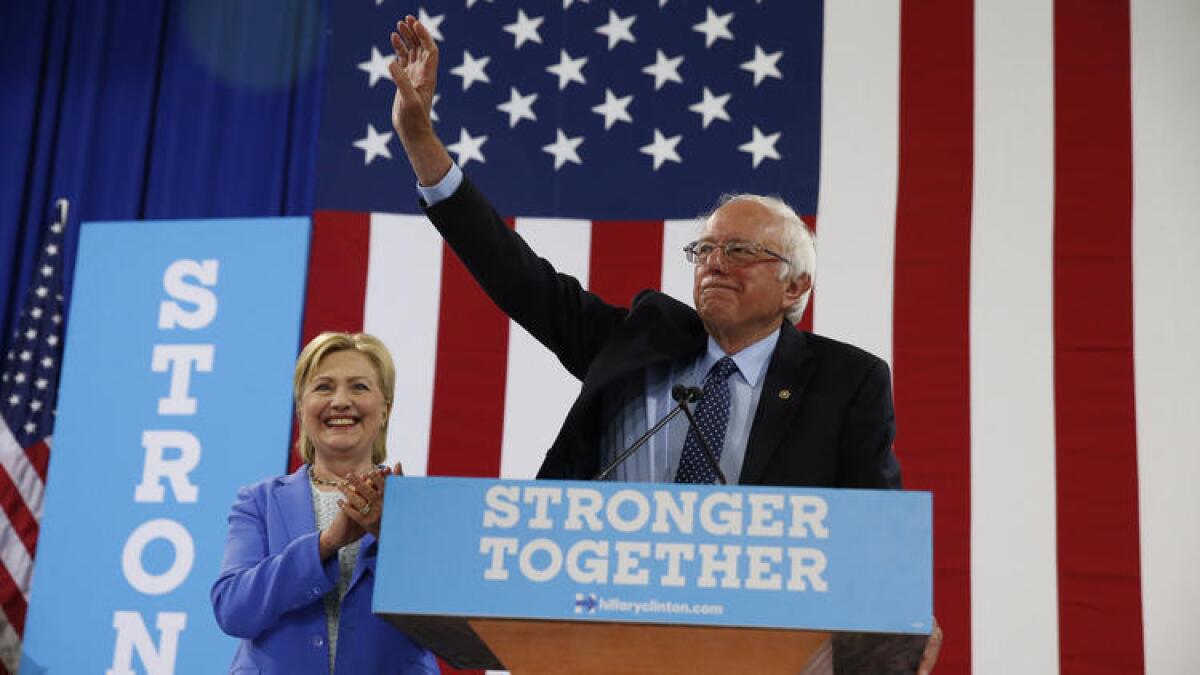Opinion: Democrats united in (over)promising to reverse Citizens United

Sen. Bernie Sanders waves as he and Hillary Clinton arrive for a rally July 12 in Portsmouth, N.H.
- Share via
In his speech Monday night at the Democratic National Convention, Sen. Bernie Sanders emphasized the positions he and Hillary Clinton have in common, including raising the minimum wage, securing abortion rights and protecting the environment. But Sanders placed special emphasis on reversing the Supreme Court’s 2010 Citizens United decision.
Watch Hillary Clinton’s acceptance speech »
“This election is about overturning Citizens United, one of the worst Supreme Court decisions in the history of our country,” Sanders said. “That decision allows the wealthiest people in America, like the billionaire Koch brothers, to spend hundreds of millions of dollars buying elections and, in the process, undermine American democracy. Hillary Clinton will nominate justices to the Supreme Court who are prepared to overturn Citizens United and end the movement toward oligarchy in this country.”
Sanders’ description of the court’s ruling in Citizens United is, to be charitable, imprecise. Billionaires have been able to spend unlimited amounts of their money on election-related speech since the Supreme Court’s 1976 Buckley vs. Valeo decision (which is why more sophisticated critics of Citizens United also want to overrule Buckley.)
Full coverage: The Democratic National Convention »
Also, despite Sanders’ reference to “buying elections,” Citizens United wasn’t about contributions to political candidates. Rather the case (which involved a nonprofit corporation that produced a documentary critical of Hillary Clinton) stands for the proposition that corporations may spend treasury funds on independent expenditures.
But wasn’t Sanders correct when he said that Clinton would nominate justices “who are prepared to overturn Citizens United”? Probably not in the sense that he means.
Sanders has made it clear on other occasions that he thinks presidents can demand that a Supreme Court nominee commit herself in advance to voting a certain way as a condition of being nominated. Here’s what he said in a debate with Clinton in April when he was asked if he would ask President Obama to withdraw his nomination of Judge Merrick Garland to the court if Sanders won the election. Sanders answered yes and added this:
“I think that we need a Supreme Court justice who will make it crystal clear, and this nominee has not yet done that, crystal clear that he or she will vote to overturn Citizens United and make sure that American democracy is not undermined.”
Not only would making such a promise be unethical. Even some Democratic senators might balk at confirming someone who broke the so-called Ginsburg Rule. (Justice Ruth Bader Ginsburg told the Senate she would offer “no forecasts, no hints” about how she would decide cases.)
Hillary Clinton knows this, which is probably why she has been more circumspect than Sanders. Earlier this month she said she would appoint Supreme Court justices “who understand that this decision was a disaster for our democracy.” But, unlike Sanders, she didn’t suggest that she would ask her nominees to promise to vote that way.
But Clinton has engaged in some Citizens United hype of her own. She promised that in her first 30 days as president she would call for a constitutional amendment to overturn Citizens United. It sounds dramatic, but she can do that now; besides, as president she would have no formal role in the amendment process.
Whatever their other differences, Clinton and Sanders are united (as it were) in suggesting that they can easily do away with a decision that is demonized on the left.
A constitutional amendment to overturn Citizens United is going nowhere. And while it’s possible that one or more Clinton appointees might join with other liberal justices in voting to overturn the decision, that is far from guaranteed. More likely, a liberal majority would narrow the decision’s reach.
But that’s the sort of nuance that gets lost in convention speeches.
Follow the Opinion section on Twitter @latimesopinion and Facebook
More to Read
A cure for the common opinion
Get thought-provoking perspectives with our weekly newsletter.
You may occasionally receive promotional content from the Los Angeles Times.











